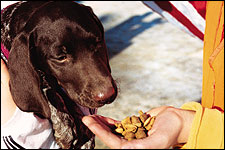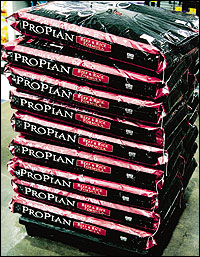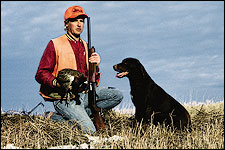The Right Food Is Vital To A Growing Pup.
By Jerry Thoms
 The debate over which food to feed a young and growing gun dog can be partially resolved by the individual pup. |
"Look at the list of ingredients on that bag of Puppy Chow--there's nothing there that a growing pup couldn't get from a good, top-quality, premium adult dog food--and at a cheaper price," a professional hunting dog breeder pointed out. She was explaining why her line of field trial champions, most born and many raised at her kennel, were brought up eating the same adult-high-performance dry kibbles from the day they were weaned as puppies, to the day they died from old age.
But, compare that point of view to this one.
"Most high-grade, best-quality puppy foods are carefully and scientifically formulated to provide the nutritional components necessary for the various stages in a young dog's growth cycles.
Leave some of these ingredients out or have too many in at the wrong time and serious nutritional deficiencies or excesses could result with destructive physical and psychological consequences." All this was part of a puppy-chow sales pitch delivered by a representative of a major dog food manufacturer. He obviously was in favor of consumers spending the extra bucks for Puppy Chow specially made for growing gun dogs.
What is right on the question of what dry kibbles are best for a just-weaned pup or an adolescent young dog nearing or passing it's first birthday? "Either point of view could be good," according to Dr. Jim McKnight, a veterinarian from Brookings, South Dakota. "Some breeds and particular lines of hunting dogs probably have been genetically programmed to survive and thrive on the higher-quality adult dog foods. Feeding these breeds and lines of pups more expensive puppy chow sure won't hurt them. But, doing so won't necessarily help them either," McKnight says.
"Conversely, some gun dog breeds and some lines of these breeds may be more sensitive to subtle variations in dog food ingredients. Having the correct type and amount of protein and fat, special carbohydrates, specific kinds and quantities of vitamins, minerals, and trace elements formulated especially for puppies, might be a better feeding program for some young dogs," McKnight suggests. So, how do you choose which dry kibble to feed a growing puppy from the weaning stage to the full-grown adult phase of it's life?
Ask The Breeder
"Ask the breeder of your new puppy for recommendations as to what brand and type of kibble is best for their particular breed and line of dog," according to Larry Hansen, a professional gun dog trainer and breeder of a hunting line of English cockers at his kennel in Tracy, Minnesota. "If this is the breeder's first litter of pups, be cautious of any answers unless based on obvious first-hand and successful experiences with a specific make and kind of dog food. If the breeder has had many litters from his or her line of dogs, ask for references from other puppy owners who have purchased pups from the kennel. And do ask those people what they have successfully fed their dogs from the puppy to the adult phases of their lives," Hansen advises.
"Get information on specific points of dog development as they relate to nutrition," Hansen suggests. "Ask about bone and joint development, weight control, and sustained energy levels as puppy owners have fed the recommended dry kibble through the early stages of their dog's lives. And, pay particular attention to any reasons given for any changes in brand or type of food used," Hansen adds.
Check With Your Vet
"Most veterinarians will have specific points of view on what to feed puppies in general," in the opinion of Tom Dokken, a gun dog trainer and Labrador breeder from Northfield, Minnesota. "If a vet recommends an adult-type food with no particular brand preference, be sure to ask for details on why this is a good choice. Conversely, if a veterinarian directs you to only one brand and one type of puppy chow, then wants to sell you that one product, be cautious of possible vested self-interests," Dokken suggests.
"Though most dog vets haven't had a lot of formal training in animal nutrition back in vet school, most all practicing veterinarians have ample opportunity to attend professional seminars on canine nutrition, according to my veterinarian," Dokken says. "Be sure to ask 'your' vet if he or she has been keeping up to date on developments in dog food by regularly attending seminars and conferences on these subjects," Dokken suggests.
Call The Dog Food Manufacturers
"The commercial makers of dog food will all have definite perspectives on exactly what brand and kind of dry kibble to feed your new pup," in the words of Sharon Lund, Marketing Manager for Tasco/Royal Canin, the world's largest maker of dog food. "Most dog food bags will provide recommended feeding guidelines on the bags of their products and will include phone numbers (usually toll free) for customers who want more information. 'Read' the recommendations and 'call' the companies for complete details on why their products are best for your young dog," is Lund's advice. "Ask specific questions about protein and fat quality and quantities, types and ratios of carbohydrates, and the forms and amounts of nutritional supplements in their products. Inquire as to the sort of product tests done with puppies in general and with your specific breed of gun dog in particular. Beware of vague generalizations and unsubstantiated claims," Lund suggests.
 Commercial puppy foods are readily available in stores, but check the ingredients. |
Listen To The Dog Food Retailers
"Don't feed that brand of puppy chow to your new dog because that product won't promote good physical development, might make him sick, possibly could kill him. Do use only this make of dog food because it's the 'only one' with natural ingredients in the right proportions to grow a healthy puppy into a healthy adult dog." This is the condensed version of a sales spiel delivered by a clerk at a major pet food retail outlet store, one of hundreds spread across the country. Though popular brands of dog chow were on the shelves, this dog-food expert had an obvious personal opinion on the one best product to feed a puppy.
No questions were asked about the breed of dog, or the background of it's parents. And, no concrete facts based on believable research were given to support this one sales-person's point of view. Similar sales arguments are occasionally made in grocery stores and other dog food retail outlets. You don't need to be warned about being skeptical and cautious in these circumstances.
Do Your Homework
Do research on canine nutrition in general and puppy food in particular by reading magazines and books on these subjects. Though your veterinarian will have opinions on best products and the dog chow manufacturers will have plenty of information on what they make, there are some other sources of knowledge worth considering when making a final decision on what exactly to feed your puppy.
Canine Nutrition (What Every Dog Owner, Breeder, and Trainer Should Know) by Lowell Ackerman, D.V.M. (800-777-7257) is a comprehensive, 254-page publication that covers every major aspect of dog food manufacturing and use. There are chapters on: "Nutritional Needs; Feeding the Growing Puppy;" "Basic Nutritional Components--Proteins, Fats, Carbohydrates," "Vitamins," "Minerals;" and "Guidelines For Selecting a Dog Food." I've made a personal money-back-guarantee to five veterinarians and to several of my gun-dog-owning hunting buddies who I persuaded to buy this book (it was the only way I could stop them from borrowing and not returning my copy). So far, all have kept the book they have purchased and I've kept my $20.00.
Canine Nutrition contains a great deal of material directly relevant to making wise choices when feeding a young gun dog.
Do Trust Your Puppy
"Though there obviously are different points of view on exactly what is the best dry kibble to feed a puppy, your puppy is the best one to settle any arguments on this issue," in the opinion of Dr. Jim Rieser, a veterinarian and breeder of German shorthair pointers.
"No matter what you feed your new puppy, you should always watch for the signs of normal, healthy development," Rieser adds. "Bright eyes, a glossy coat, and lots of sustained energy are universal signs of a well-nourished pup," Rieser says. "Eyes without a healthy shine, dull hair full of flakes, and a pup that would rather sleep than play are all indicators of a probable nutritional deficiency. A change in brand or type of dog food might be necessary," Rieser points out.
 A good start with proper nutrition avoids this--overweight adult dogs |
"Loose stools and chronic diarrhea are often obvious indicators that a particular brand or type of kibble may not be right for your young dog," Rieser cautions. "If your pup produces 'cow plops' instead of firm stools, check with the breeder of your young dog, talk to the dog food manufacturer, and go to your vet for advice on what to do. Sometimes changing dog food brands or the type of dry kibble can be the answer to these and other nutrition related problems," Rieser suggests.
"Watch out for 'over-weight' puppies," Rieser cautions all gun dog owners. "The idea that puppies 'should be' fat is an old wives tale that is really dangerous in a young dog's development and general well-being. A fat puppy can easily become an overweight adult dog with a life-long and sometimes life-threatening eating disorder," Rieser warns.
"If you have a favorite brand of puppy chow and you're 100-percent satisfied with it's quality, you should obviously stay with that product," Rieser says. "But, don't be brand-blind with a compulsive dedication to one dog food manufacturer's kibble€¦there are many very good puppy chows and excellent premium adult dog foods on the market. Do some research and use the advice of the experts, then find a dry kibble that is just right for your growing gun dog." "No matter what kibble choice is made to feed a gun dog puppy, the most important decision is to pick a premium-quality product," Dr. Rieser emphasizes. "That almost always means you have to buy the more-expensive food with the highest-grade of protein, fat, and carbohydrate ingredients and with the right levels of vitamins, minerals, and trace elements."
"Low-quality and low-quantity meat meal with too much grain as a protein source can lead to nutritional deficiencies and problems for a growing puppy just as with an adult dog. These conditions often won't show up until the young dog is too old for the negative effects in development to be changed for the better," Rieser warns all puppy owners.
"Buy the best and ignore the rest, in other words," is Rieser's suggestion when choosing and using a dry kibble to feed your growing gun dog puppy.






